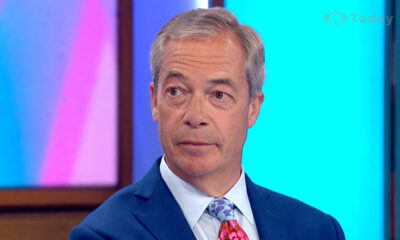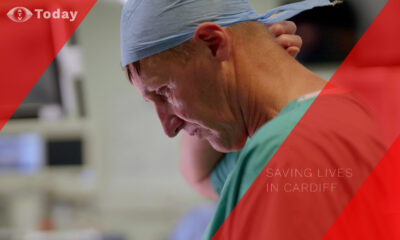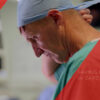In today’s China, looking good is seen as key to career success…
In a new investigation for BBC Two, BBC Eye hears from patients in China trying to fix the damage of botched cosmetic surgery and investigates one of the country’s most notorious botched surgeries. With videos promoting controversial beauty stands like extreme weight loss flooding social media and beauty apps making surgery a click of a button away, China’s cosmetic surgery industry is booming.
Every year, 20 million pay for cosmetic procedures in China. Over 80 percent of them are women, and their average age is 25. Once seen as taboo, plastic surgery has exploded in popularity over the last 20 years in China, fuelled by rising disposable incomes and shifts in social attitudes, largely driven by social media. While appearance has always been important in Chinese culture, particularly for women, beauty standards in the country are changing.
For years, the most sought-after features were a blend of Western ideals, anime fantasy and K-Pop inspiration: the double eyelid, the sculpted jawline, the prominent nose, and the symmetrical face. But lately, more disturbing procedures are on the rise — chasing an unrealistic, hyper-feminine, almost infantile ideal.
Botox is now injected behind the ears to tilt them forward, creating the illusion of a smaller, daintier face. Lower eyelid surgery, inspired by anime characters, widens the eyes for an innocent, childlike look. Upper lip shortening narrows the space between lip and nose, thought to signal youth.
Cosmetic surgery apps like SoYoung (新氧‘New Oxygen’) and GengMei (更美 ‘More Beautiful’) – claiming to offer algorithm-driven analysis of “facial imperfections” – have been surging in popularity. After assessing users’ faces, they provide surgery recommendations from nearby clinics, taking a commission from each operation. These and other beauty trends are shared by celebrities and influencers on social media, rapidly changing what’s considered desirable and normal.
However, the surge in demand for cosmetic surgery in China has led to a shortage of qualified practitioners and licensed clinics. Hundreds of accidents are happening inside Chinese clinics every day. In 2020, actress Gao Liu’s had a nose surgery at a Guangzhou clinic called ‘She’s Times’ (熙施时光). Her surgeon Dr He Ming was branded as the clinic’s ‘chief surgeon’ and a nose surgery expert.
Gao Liu’s surgery resulted in the tip of her nose turning black due to lack of circulation. After seven days of worsening symptoms, she was transferred to a top public hospital, but the damage was permanent. After four years and two repair operations, her nose remains damaged. Gao Liu spoke out about her botched cosmetic surgery and her story quickly went viral. Under pressure, the authorities acted quickly.
Within weeks, Guangzhou Health Commission announced sanctions of the clinic and her surgeon, Dr He Ming. This was the sixth time the clinic had been sanctioned – the previous five times were for other breaches of their rules. And it was revealed that Dr. He Ming was not qualified to perform plastic surgery unsupervised. Dr He was barred from practicing for six months but was never named in the authority’s announcement. The clinic closed down soon after the scandal. However, weeks before it was officially dissolved, a new clinic Qingya (轻雅 ‘Light and Elegant’) requested to register at the same address.
BBC Eye has investigated the strong links between the two clinics, both licensed to carry out cosmetic procedures and registered under different legal representatives. BBC Eye found that She’s Times’ Weibo account switched to promote this new clinic Qingya since it opened, and the styles of their social media promos are consistent. Qingya also retained several of She’s Time’s senior staff, including Dr He Ming.
Records on the national database of health professionals show that Dr He only obtained the licensed plastic surgeon qualification in April 2024; even though the qualification shouldn’t have been granted to him according to Guangdong Provincial Health Commission rules, which disqualifies surgeons who have been sanctioned by any health commission from obtaining the qualification/status for five years. Dr He Ming was sanctioned in 2021, three years before he obtained the license.
In secretly recorded footage from a recent consultation, a staff member at Qingya clinic says Dr He Ming “has been working with them for seven, eight years” and he’s been crowned “Nose King of Guangzhou” for completing the most nose surgeries in Guangdong province in 2023. While Dr He Ming could only meet the patient briefly between operations, he said he’s been doing nose surgery since 2012.
In November 2024, Dr He Ming started a social media account as a nose surgery expert. He claims to have nearly 20 years of experience and to have done 10,000 operations. Qingya, Dr He Ming’s new employer, has been expanding rapidly. It claims to have opened 30 branches. BBC Eye put these allegations to Dr He Ming and the clinic Qingya. They did not respond.
BBC Eye also contacted the Guangdong Provincial Health Commission, to ask why Dr He Ming was able to obtain the licensed plastic surgeon qualification against their rules, and why they haven’t investigated the links between the clinics She’s Times and Qingya. They did not respond.
The Chinese Embassy in the UK says:
“The Chinese government consistently requires enterprises to operate in strict compliance with national laws, regulations, and relevant policy provisions.”
BBC Eye “Make Me Perfect: Manufacturing Beauty in China” will air on BBC Two at 11 pm tonight, Wednesday 23 April. It is now available to stream on iPlayer, the BBC World Service YouTube channel and the BBC News Chinese YouTube channel. It will soon become available on the BBC News Vietnamese, BBC News Korean and BBC News Indonesia YouTube channels.











